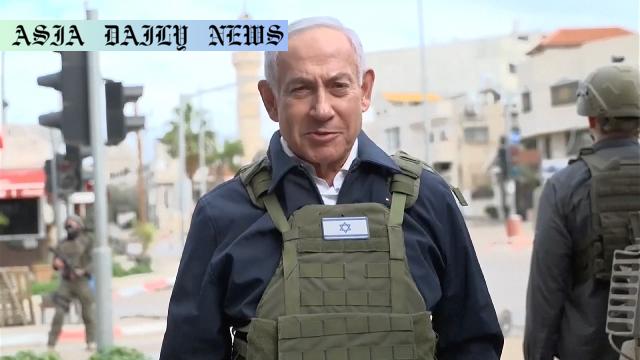Netanyahu visits northern Gaza, vows to intensify military pressure on Hamas, proposing a ceasefire coupled with disarmament.
- Netanyahu visited northern Gaza and pledged more military pressure on Hamas.
- Israel proposed a 45-day ceasefire if Hamas agrees to disarm.
- Since mid-March, resumed violence in Gaza left 1,630 dead.
- Hamas is expected to respond soon to Israel’s offer.

Netanyahu’s Commitments to Intensify Pressure on Hamas
On Tuesday, Israeli Prime Minister Benjamin Netanyahu visited northern Gaza amidst escalating tensions and violence, reiterating his government’s resolute intention to apply increased military pressure on Hamas, the ruling Islamist group in Gaza. “Hamas will suffer more and more blows,” Netanyahu declared firmly during his visit. His remarks underscore a steadfast strategy to force concessions from Hamas, which remains at odds with Israel over the terms for a permanent ceasefire agreement.
While negotiations for peace are ongoing, the two parties remain deeply divided. As part of a new proposal to bring about a truce, Israel has suggested a 45-day ceasefire contingent on Hamas’s agreement to disarm. Israel has further pressed for the release of 10 hostages as a critical precondition. Hamas’s response to the proposal is anticipated soon, yet the history of stalled negotiations and intermittent violence paints an uncertain picture of the peace process.
Civilians Bear the Brunt Amid Rising Death Toll
The human cost of the violence continues to escalate. Following a pause in ceasefire negotiations, Israeli forces resumed their campaign in Gaza in mid-March, dramatically intensifying the conflict. According to Palestinian media sources, an aerial bombing in Gaza City on Wednesday claimed the lives of 10 individuals, adding to an already mounting death toll that has reportedly reached 1,630 casualties since the resumption of hostilities.
Local health authorities within Gaza have consistently highlighted the dire humanitarian crisis unfolding due to the cyclical violence. Displacement, loss of livelihood, and lack of access to basic services have compounded the already precarious living conditions in the region. The ongoing military operations and the seeming intractability of the peace talks are prolonging the suffering of countless civilians caught in the crossfire.
Challenges in Achieving a Lasting Ceasefire
Efforts to secure a long-term ceasefire are fraught with complexities. While Netanyahu’s government has demonstrated an unwavering focus on demanding concessions from Hamas, including disarmament, the group has historically rejected any measures they perceive as compromising their autonomy. For its part, Israel views a disarmed Hamas as a prerequisite for ensuring long-term security and stability in the region. However, any resolution will hinge on overcoming mutual distrust and creating an environment conducive to compromise.
Previous ceasefire agreements have faltered under the pressures of retaliatory attacks and unsatisfied demands on both sides. The latest Israeli proposal for a 45-day ceasefire includes a critical demand for the release of 10 hostages held by Hamas. The question remains whether the Islamic group will reciprocate with a goodwill gesture or continue to resist Israeli pressure, potentially stalling progress toward peace even further.
The Broader Geopolitical Implications
The prolonged conflict between Israel and Hamas continues to have significant implications not only for the Middle East but for international diplomatic efforts as well. Many global actors have called for restraint, urging both parties to prioritize the safety and security of civilians. As of now, however, both Israel and Hamas remain entrenched in their positions, complicating the prospects for external mediation.
Critics have also raised concerns over the disproportionate impact of violence on civilian populations, particularly in Gaza. Israel’s stance on disarmament is seen as a crucial step to ensuring long-term peace, but some argue that a balanced approach addressing the grievances of both sides is necessary to build trust and achieve sustained stability. Amidst geopolitical maneuvering and international scrutiny, the humanitarian aspect must not be overshadowed.



Commentary
The Persistent Cycle of Violence Between Israel and Hamas
The latest developments in the Gaza conflict underscore the cyclical nature of violence between Israel and Hamas, where each attempt at a ceasefire appears to be met with renewed hostilities. Netanyahu’s visit to Gaza, coupled with his firm stance on intensifying pressure on Hamas, reflects a commitment to protecting Israel’s interests. However, the human cost of the prolonged violence is impossible to ignore and raises ethical concerns about disproportionately impacting civilians.
Challenges of Negotiation and Striking a Balance
The proposal for a 45-day ceasefire appears to be a positive step toward de-escalation. However, including a critical demand of disarmament complicates matters. While Israeli security concerns are legitimate, such demands could be perceived by Hamas as an infringement on their governance and autonomy. Balancing these opposing perspectives is vital to fostering trust, a crucial element conspicuously absent in these negotiations.
The Humanitarian Impact and Responsibility
The rising death toll in Gaza and the devastating consequences for its population cannot be dismissed as collateral damage. The humanitarian crisis demands immediate international intervention and accountability. Beyond the political and military strategies, prioritizing civilian safety must guide policy decisions. Global leaders and mediators need to amplify their efforts to hold both parties accountable for reducing hardships on their respective populations.
Future Prospects
Ultimately, achieving lasting peace will require a paradigm shift in how both Israel and Hamas approach the negotiation table. Short-term solutions such as ceasefires must be accompanied by long-term discussions addressing core grievances that perpetuate the conflict. Without meaningful dialogue and a collaborative effort to rebuild trust, the cycle of violence will unfortunately persist.